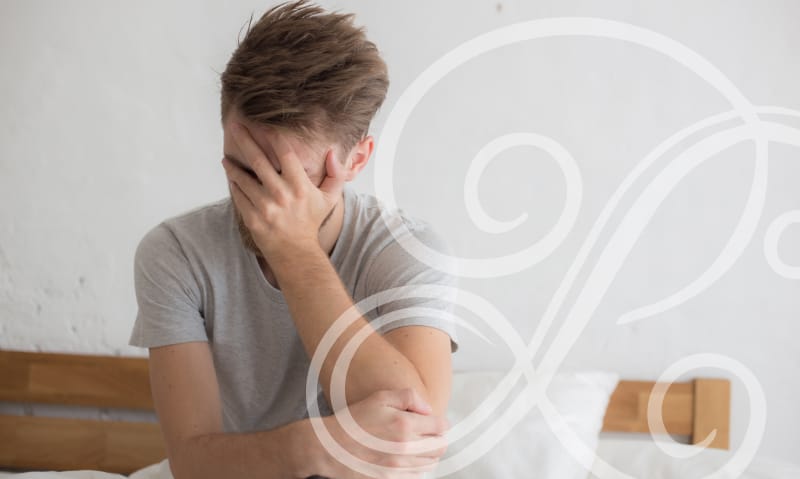Are You at Risk for Sleep Apnea? Signs You Should Get Tested

1 in 15 adults has sleep apnea.
According to UCLA Health, one in 15 adult Americans has moderate-to-severe obstructive sleep apnea. What exactly is sleep apnea? Sleep apnea is a condition where your airways become restricted during sleep. Sleep apnea can cause someone to stop breathing and then wake suddenly. If you find you aren’t getting a good night’s sleep, come see the team at Parmer Lane Family Dentistry in Austin, Texas for an evaluation where you can ask our team about sleep apnea treatments for those who suffer from the condition.
2 Types of Sleep Apnea
There are two types of sleep apnea: central and obstructive. Central sleep apnea happens when your respiratory muscles fail to activate to breathe. Central sleep apnea can also happen when the brain doesn’t send signals to the respiratory muscles to activate breathing. Obstructive sleep apnea is more common, and it happens when the throat muscles relax. Obstructive sleep apnea is the type that dentists can treat, because obstructive sleep apnea can often be treated with an oral device.
Symptoms of Sleep Apnea
There are many things that can be a cause of sleep apnea, but it is important to remember that you don’t have to have all of these symptoms to have sleep apnea. But if you are experiencing any of these symptoms, it may be time to talk with your health professional about sleep apnea.
Snoring
Snoring is the most common symptom of sleep apnea, however, not everyone who snores has sleep apnea and not everyone with sleep apnea snores. The reason why snoring can be a symptom of sleep apnea is because of how snoring works. When you snore, the sound creates vibration through the throat and soft tissues of the mouth. Sometimes, this sound vibration can block the airway momentarily, causing sleep apnea.
Gasping or Choking While Sleeping
If you find you are gasping or choking while trying to fall asleep, sleep apnea could be the cause. Gasping or choking while falling asleep is a common sign of obstructive sleep apnea and happens because your airway begins to relax while you sleep, and, in some people, closes, causing your airway to be restricted. This can then jolt your body awake as you are gasping or air during that moment. Often this cycle repeats until the person finally falls into a deep sleep.
You may not be aware that this is happening, because your breathing returns to normal very quickly, and your body may not jolt awake suddenly. Sometimes this symptom can only be seen by someone observing you sleep.
Dry Mouth
Waking up with a dry mouth can be a symptom of sleep apnea. Dry mouth often happens to people who breathe through their mouth at night, and those who breathe through their mouth at night often do so to help avoid their airways being obstructed.
Falling Asleep During Mundane Tasks
If you find yourself sleep deprived and falling asleep while doing simple, mundane tasks, you might have sleep apnea. Those who suffer from sleep apnea often don’t get a good night’s rest, so when it comes to activities that don’t require their complete attention, some sleep apnea sufferers find themselves nodding off while performing simple tasks. This can be dangerous if a person is working around machinery, or even driving. If you find yourself falling asleep during mundane tasks, make sure to talk to your healthcare professional about why you might be drowsy during the day.
General Poor Health
Since sleep apnea causes a chronic lack of a good night’s sleep, suffering from undiagnosed sleep apnea can take a toll on a person’s overall health. The dipping of oxygen levels due to the restriction of airflow can also affect your overall health. Doctors have also found that sleep apnea patients can suffer from mood swings, including agitation, and also tend to have poor eating habits because of them being tired and not awake enough to prepare proper, healthy meals.
Poor Mental Health
Sleep apnea can also affect someone’s mental health, along with their physical health. Since sleep apnea leads to interrupted sleep cycles, sleep apnea can lead to a variety of mental health issues, like depression and anxiety. The lack of sleep you experience as someone who suffers from sleep apnea can contribute to mental illnesses like depression, bipolar disorder, and schizophrenia. T
hose with sleep apnea often have high levels of glutamate, which is a neurotransmitter responsible for many central nervous system functions. High levels of glutamate can cause irregularities in your mood and concentration. Sleep apnea sufferers can also have low levels of GABA, which is another neurotransmitter that slows down brain function to the central nervous symptoms. Those with low GABA numbers often experience mood swings and mood disorders.
Chipped or Cracked Teeth
Another symptom of sleep apnea could be those who have worn, chipped, or cracked teeth, especially if they have bruxism, or grind their teeth. Doctors say about a quarter of those who grind their teeth at night suffer from sleep apnea because the grinding can cause your airway to be restricted briefly during your sleep.
Parmer Lane Family Dentistry can help those with sleep apnea.
If you experience any of the symptoms listed above and are worried you might have sleep apnea, schedule an appointment with the team at Parmer Lane Family Dentistry. Our dentists can perform an easy test to help determine if you have sleep apnea, and then we can work with you on a treatment plan to help you get a good night’s rest.